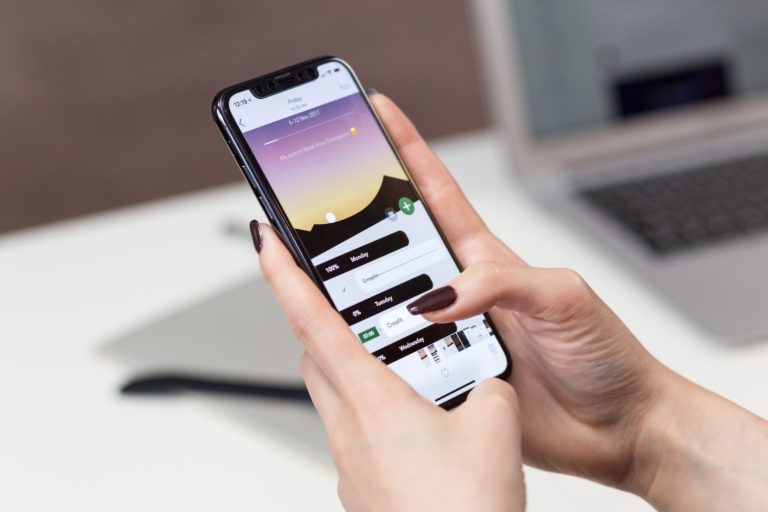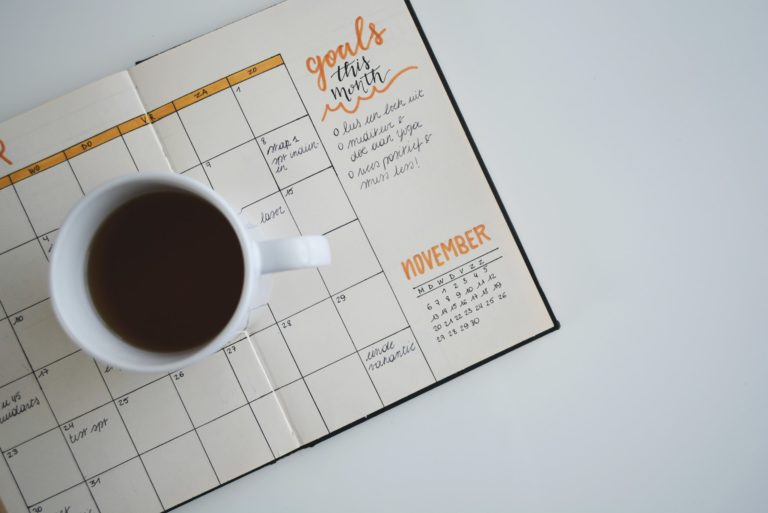Daily planners are essential for team success. But different apps are designed for different purposes. Let’s take a look at the best planner apps on the market to help you choose the best one for you.
Juggling personal and professional responsibilities can be near impossible without the right tools. Everyone can benefit from order in their lives, and planner apps are the best way to help your business run efficiently.
While some people still use pen and paper, there are better, newer, more efficient digital tools for short-term and long-term planning.
Daily planner apps can help you and your team easily plan out upcoming days, weeks, and months.
But how do you choose the best planner app for your business? These are the 10 best planner apps for employees.
Our Top Picks
-
1
Best all-in-one planner app
-
2
Good for iOS users
-
3
Best for scheduling tasks and meetings
Why trust us?
Our team of unbiased software reviewers follows strict editorial guidelines, and our methodology is clear and open to everyone.
See our complete methodology
What to Look For in a Planner App
Here’s a list of what to look for in the best planner apps for employees:
- Scheduling and calendar app integration: The app should offer scheduling capabilities so employees can create and manage tasks, events, and appointments.
- Task management and organization: Look for a planner app that allows employees to create, prioritize, categorize, and track tasks easily. The ability to set due dates, add reminders, and mark tasks as completed will keep everyone on track.
- Collaboration features: The best planner apps support collaboration features so team members can share tasks, deadlines, and project updates with each other.
- Notifications and reminders: The app should have a reliable notification system to remind employees of upcoming tasks, deadlines, and meetings.
- Accessibility: Choose an app that works across various devices and operating systems. This way, employees can access and update their schedules and tasks regardless of their device.
- Data security and privacy: The app should comply with data security standards and protect sensitive information. Employee data should be encrypted and stored securely.
- Integration with productivity tools: Look for integration with other productivity tools like project management software, time-tracking apps, and note-taking apps. This can streamline workflows and reduce the need to switch between multiple applications.
- Analytics and reporting: Some planner apps provide analytics and reporting so employees and managers can track productivity and optimize workflows.
- Customization options: Workflow and preferences may differ, so the best planner apps offer customization options that can cater to individual needs.
The 10 Best Planner Apps
-
Connecteam — Best all-in-one planner app
Connecteam is the best planner app designed for employees working from the field. This employee management app makes business planning and task management incredibly simple. With this all-in-one app, you can prioritize tasks and plan your day conveniently from your mobile device, eliminating the need to use pen and paper ever again.
Simplified task management
With Connecteam’s task management feature, you can easily manage all of your employee tasks in one place. For every job or shift, create tasks and projects with as many details as you need, such as sub-tasks, files, images, deadlines, and checklists. Add clear due dates and send automated push notifications to any employee mentioned so they won’t miss it.
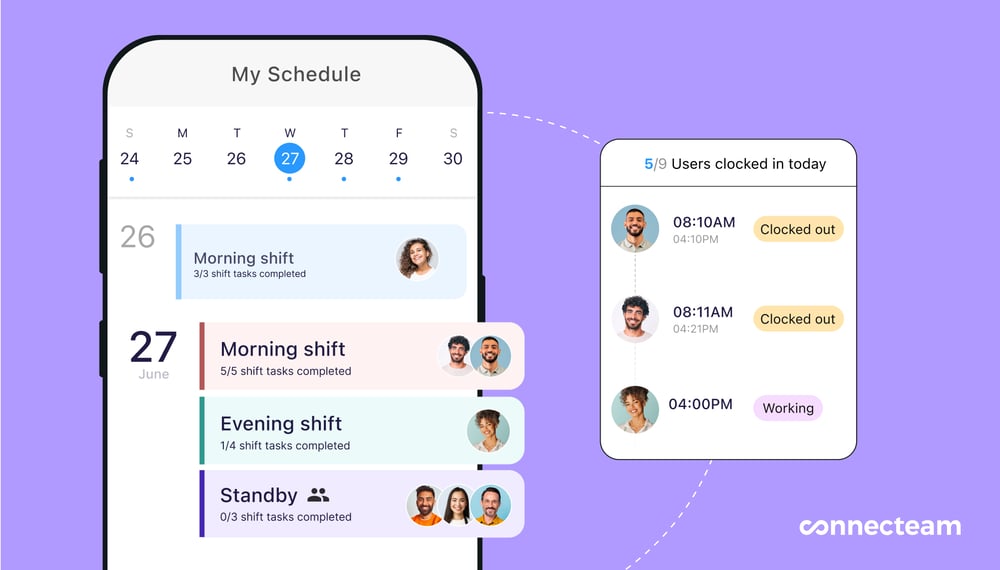
Clear visibility of all tasks and projects
By sorting by employee, due date, or completion status, you can easily find any assigned task to get a clear overview of all work-related assignments and projects.
Automated push notifications in real-time
Connecteam’s planner app sends automatic notifications to employees when they’re tagged in a task or project. That way, they’ll never miss it and know exactly what’s required of them while on the job.
Streamlined communication at any time
In-app chat allows employees and managers to stay in touch throughout the day. When workers have questions, supervisors can message them directly, and employees can contact their supervisors whenever they need clarification. Instantly collaborate with the entire team and share images, files, videos, and GIFs.
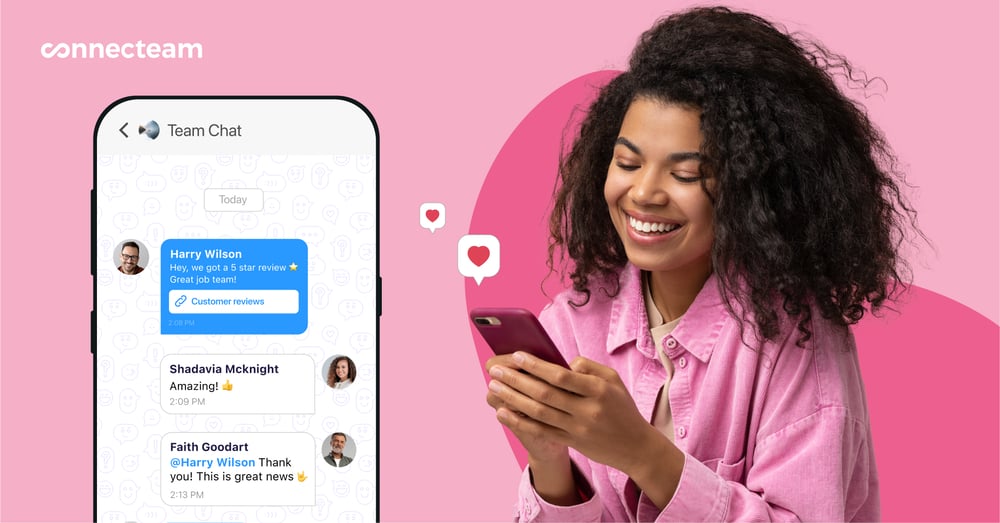
Keep your team aligned with real-time updates
With the company news feed, make sure all your staff are aware of the latest team projects, tasks, and events going on at work. Color code the newsfeed or add, images, GIFs, or videos you want to make updates visually appealing and aligned with your branding. To make sure everyone on your team is informed, you can even see which team members read team updates.
Easy, visible team scheduling
With Connecteam, managers can create employee schedules and share them directly with employees from the app. With the platform, managers can easily manage time-off requests and scheduling preferences.
They can also include important notes and documents with each shift, so employees have all the relevant information they need to do their jobs, no matter where they’re working from. Connecteam’s scheduler even integrates with Google Calendar so employees can transfer their shifts right from the app into their personal calendars.
Aside from employee scheduling templates, Connecteam also provides immediate notifications when daily schedules are published.
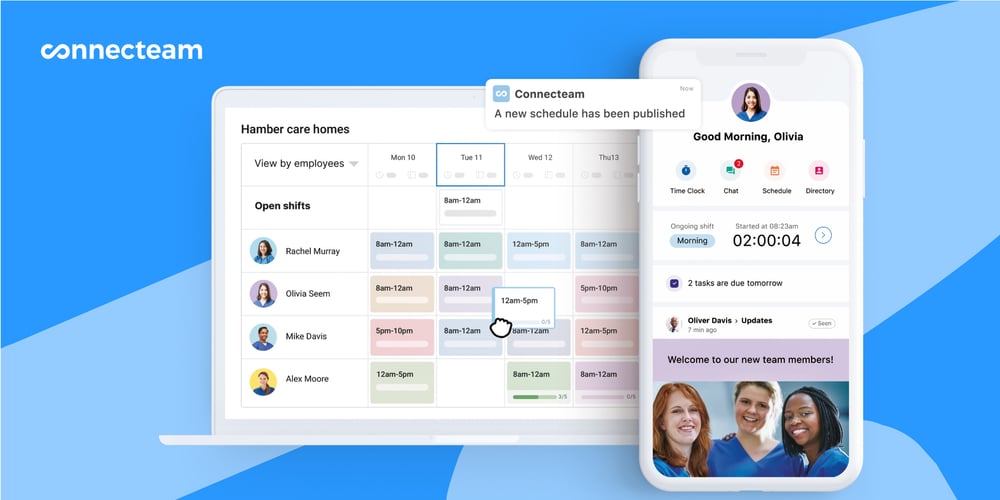
Easily create digital forms and checklists
Create customized forms and checklists for your staff, or select a premade template. Using their mobile devices, employees can execute any work task, and managers can track their progress and follow up easily.
Additionally, recurring tasks and checklists can be added to employee schedules without having to recreate them every shift.
Couldn’t manage without Connecteam! It is officially our scheduling and time-keeping software and we plan to integrate more and more features as we move forward!
Connecteam offers great value for money and is the best online agenda planner. Small businesses can sign up for Connecteam’s Small Business Plan, a free version that comes with all basic features for teams of up to 10 people. For larger teams, premium plans start at just $29 per month for up to 30 users.Connecteam also offers a free for life plan – Get Started Now!
0Key Features
Real-time performance tracking
Pros
Excellent customer support
Intuitive user interface
Compatible across multiple devices
Affordable solution
Cons
Needs internet or wifi access to work
Pricing
Free-for-life plan availablePremium plans start at $29/month for 30 users
14-day free trial, no credit card required
Start your free trial -
Things — Good for iOS users
Available on
- Web
- iOS
- Android
- Mac
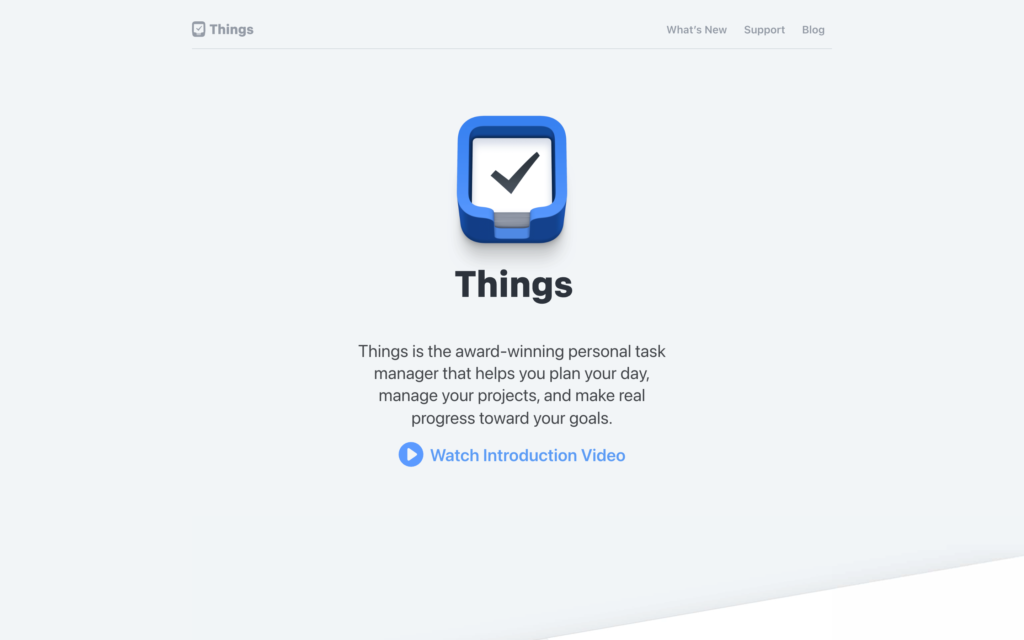
With Things, employees can easily create daily, weekly, or monthly timelines and deadlines for tasks. If they want to find a specific task in the app, they can do a simple search and this planner app will locate it instantly.
With a flat fee of $49.99 for Mac, Things is perfect for businesses who don’t want to pay a monthly fee for a planner app. However, Things is only supported by Apple devices such as iPhones and Macs, so it isn’t suitable for companies that don’t use Apple devices.
Key Features
- Task heading creator
- Add widgets
- Recurring tasks
- To-do lists
Pros
- Easy user interface
- One time purchase, no subscription
Cons
- No collaborative features
- Only compatible with iOS
Pricing
Starts at $49.99 Trial: Yes Free Plan: No
-
Google Calendar — Best for scheduling tasks and meetings
Available on
- Web
- iOS
- Android
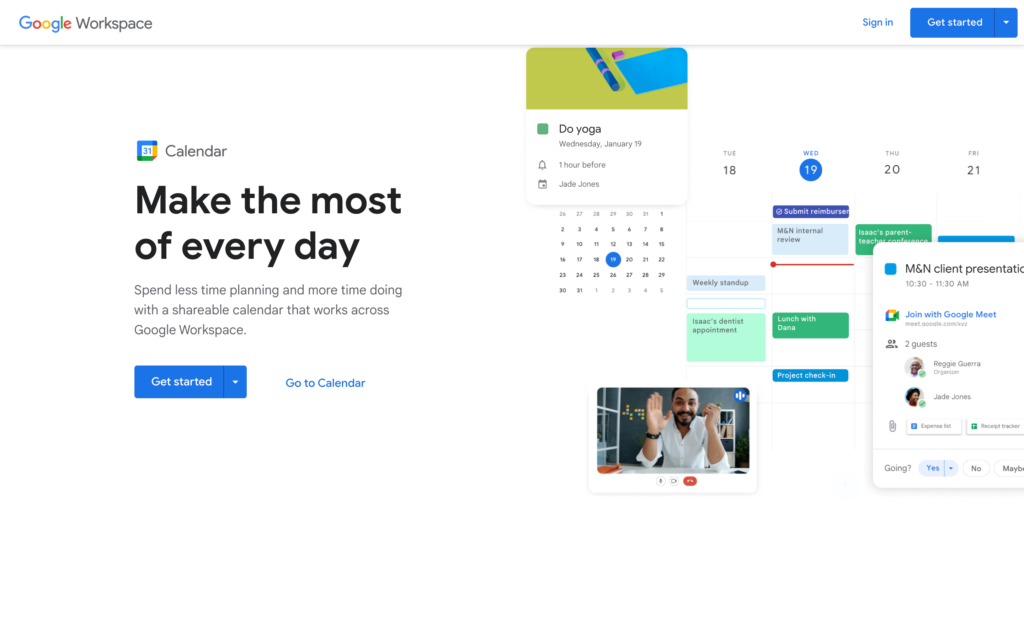
Google Calendar is easy to use and free to use. It’s great for companies that already use Google Workspace, since this planner app integrates directly with it.
When creating meetings or tasks, you need to select a time and date and then you can add it to your calendar. Additionally, you can add any details you need with the task, like location and Google documents. This planner app also makes it easy for team members to check each other’s availability to prevent any overlap in timing.
Key Features
- Simple user interface
- Sync easily with user’s events and contacts
- Add details and locations to every task
- Set task reminders
Pros
- Easy-to-share calendar with other users
- Easy to sync on all devices
Cons
- Have to set tasks for specific dates and times
- Limited integration with other calendars
Pricing
Contact vendor for price Trial: No Free Plan: Yes
-

Any.do — Good for creating checklists
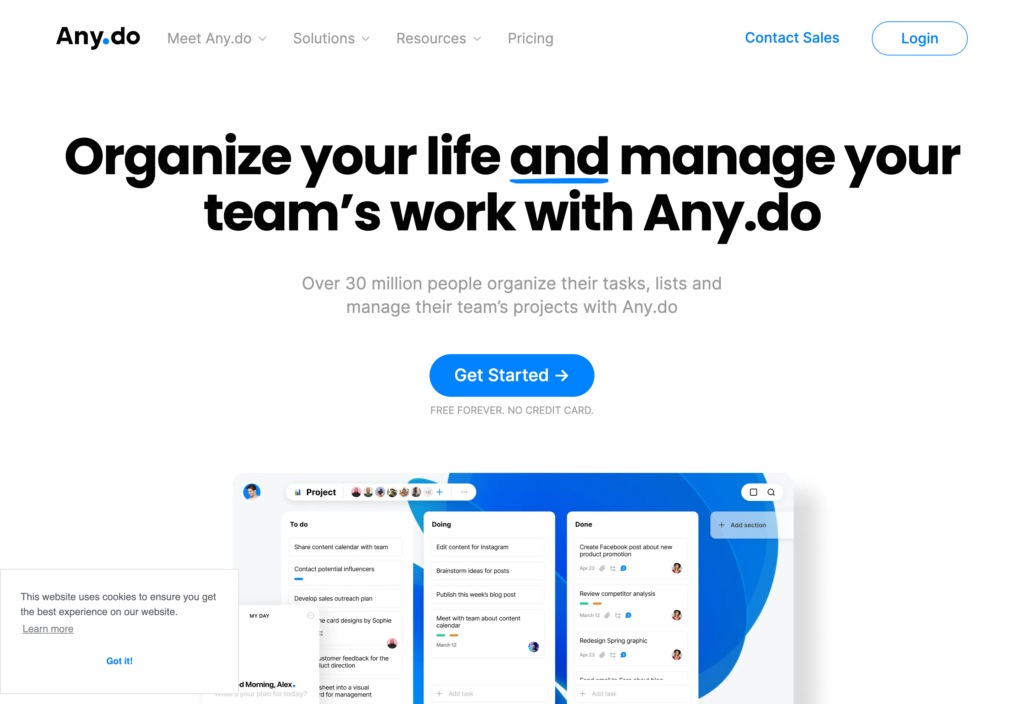
When it comes to boosting team efficiency, Any.do is an ideal planner app. With easy task creation functionality, managers can set clear deadlines and reminders for their teams. Users who require digitized checklists to tick off tasks, big and small, should check out Any.do.
Another plus is that users can manage their tasks across multiple devices, including desktop and mobile devices. With an easy-to-use calendar, to-do list, and drag-and-drop capabilities, teams can easily stay on top of all their tasks and assignments.
If you’re looking for an ideal daily planning solution, Any.do is a great, affordable option.
Key Features
- Dual-view of calendar and tasks
- Home screen widget to stay organized
- Project management roadmap
- Customizable checklists
Pros
- Compatible on iOS and Android
- Syncs easily with other calendars
Cons
- Unable to create sub-tasks
- Poor customer service
Pricing
Starts at $3/month, without Collaborative Workspace Trial: Yes — For the Teams plan Free Plan: Yes — For personal use only
-
Trello — Good for team collaboration
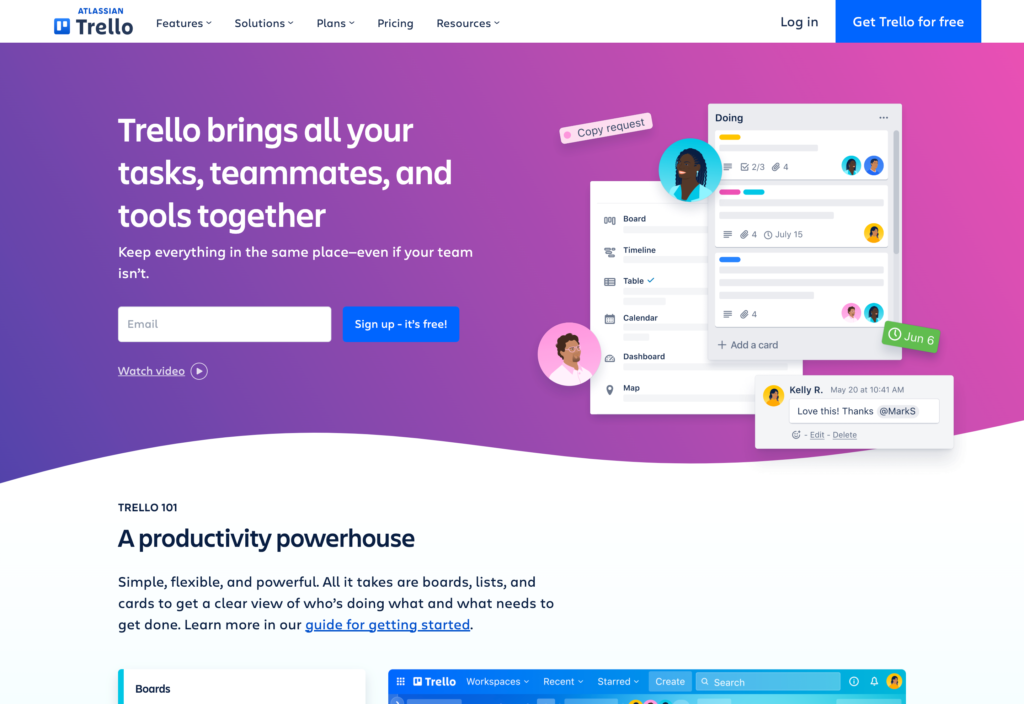
Trello allows users to keep a close eye on tasks, both professional and personal. This Kanban-based software allows users to create task boards with easy drag-and-drop functions.
Although suitable for individual use, this planner app works best in a team environment. Teams can use it to collaborate, manage projects and increase productivity. This planner app allows managers to build and manage workflows while also tracking team progress. The visual aspect of planning team projects is one of Trello’s greatest strengths.
Key Features
- Kanban boards
- Progress tracking
- Due date tracking
- Create and manage tasks/to-do cards
Pros
- High customization
- Useable offline
Cons
- Features like time-tracking require add-ons
- Difficult to manage bigger projects
Pricing
Starts at $5/user/month Trial: Yes — 14 days Free Plan: Yes
-
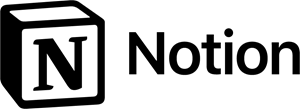
Notion — Good for customizability
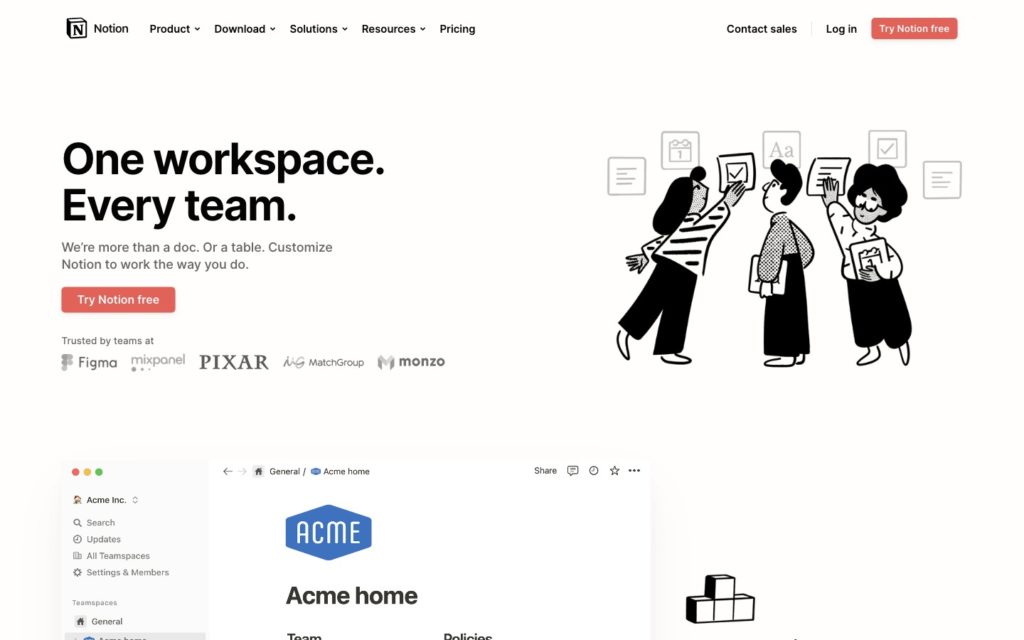
With Notion’s customization tools, teams can plan for weeks and months ahead by noting what tasks need to be completed each day.
This planner app comes with templates that assist teams with task management, planning, and scheduling. Additionally, Notion makes it easy to manage documents and attach notes and checklists.
While this planner app may not have the same kind of flexibility as other options, it’s a good fit for teams with simple task and event planning needs.
Key Features
- Document storage and note-taking capabilities
- Images and videos
- Knowledge Base
- Calendars views templates
Pros
- Free plan for life
- Very simple to customize
Cons
- Lacks advanced project management features
- Poor security
Pricing
Starts at $12/user/month Trial: No Free Plan: Yes
-
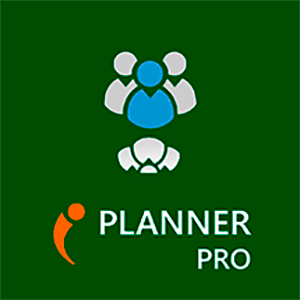
iPlanner Pro Office 365 — Good for companies that use Microsoft 365
Available on
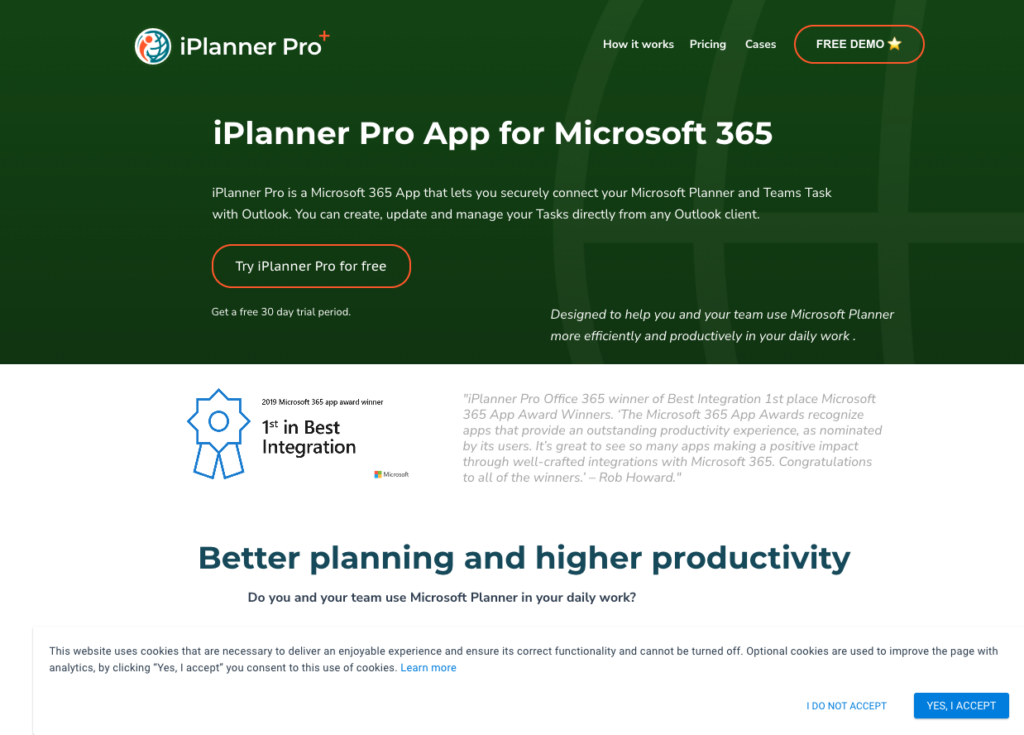
iPlanner Pro Office 365 is the Microsoft 365 planning app and integrates with all Microsoft 365 apps, including Outlook. Managing and creating tasks has never been easier due to the incredibly visual user interface.
Teams can easily create new tasks and events, organize and assign projects, share files, chat about what they’re working on, and get progress updates. iPlanner can be used to manage events, organize team projects, and collaborate with other team members. You can also sort and filter through tasks incredibly easily.
Key Features
- Filter through tasks easily
- Checklists
- Attach documents, files, images, and videos
- Advanced task management
Pros
- Fully secure
- Integrates with all Microsoft 365 tools
Cons
- Difficult setup
- Features can sometimes lag
Pricing
Starts at $2 per user, per month Trial: Yes — 30-day Free Plan: No
-

Todoist — Good for task management
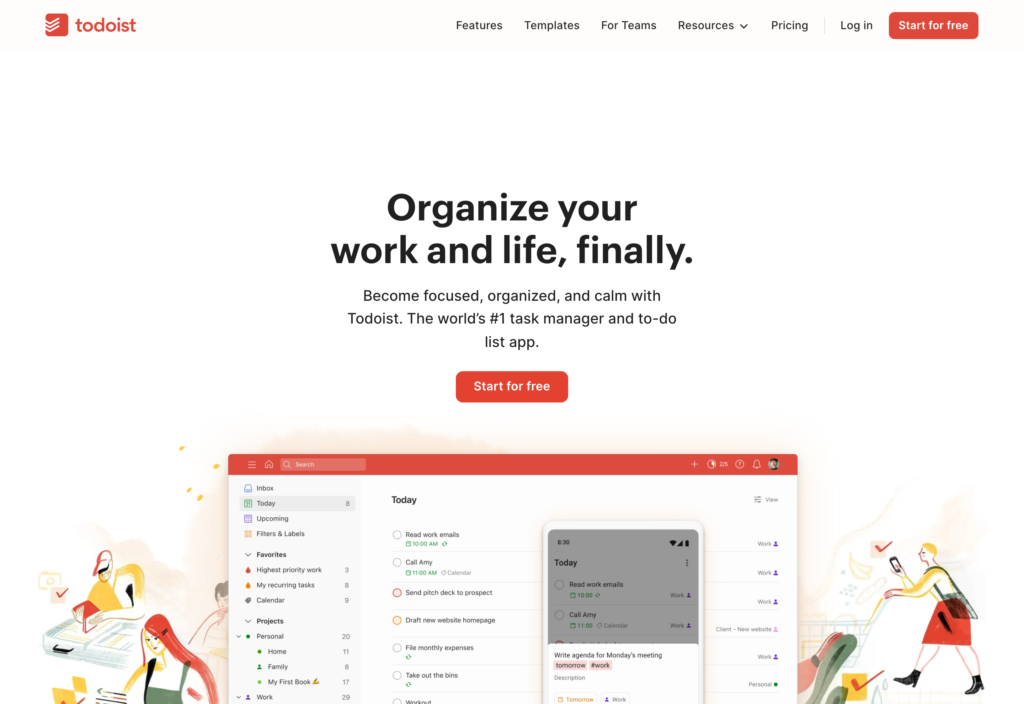
Todoist is a task management tool and digital planner designed to boost productivity and organize workflows. This planner app allows users to prioritize tasks, add, edit, and allocate projects from virtually any device. With Todoist, users can add new tasks to their schedules, prioritize tasks, simplify detailed tasks with subtasks, and also allows managers to track their employees’ productivity.
This online agenda planner also includes task management templates for 1-on-1 meetings, accounting tasks, annual reviews, appointments, blog posts, and more.Key Features
- Task management templates
- Productivity charts
- Subtask creation
- Productivity tracking
Pros
- Easy, simple user interface
- Input tasks in seconds
Cons
- Not all features available with free plan
- Expensive solution
Pricing
Starts at $150/month, for 50 users Trial: Yes Free Plan: Yes
-

Habitica — Good for building healthy habits
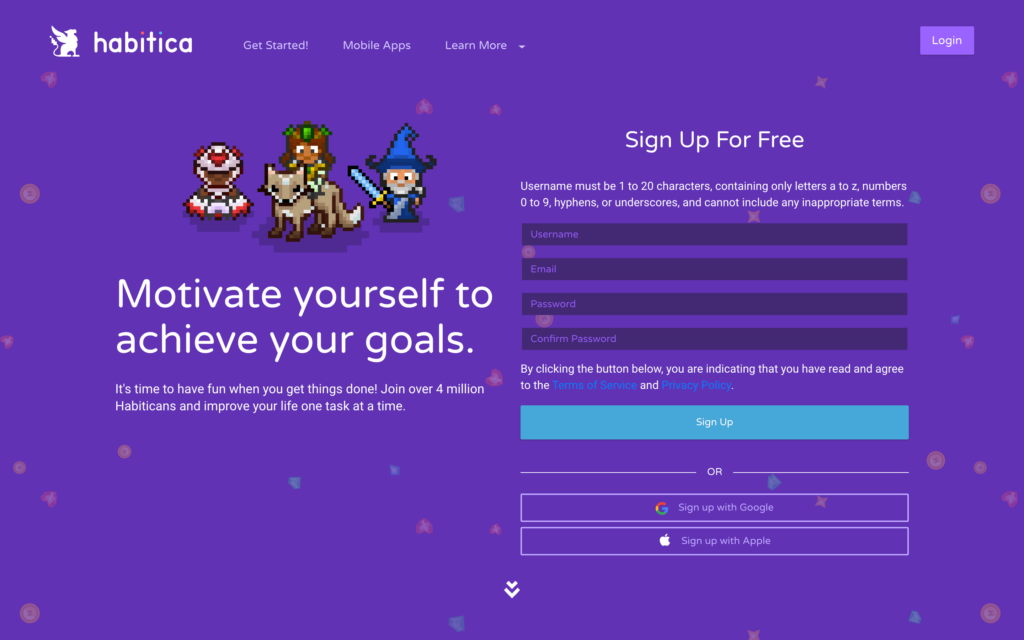
As the name suggests, Habitica is a habit-building app that aims to increase productivity with gamification widgets and avatars. Users operate the app as avatars and can earn points and bonuses by completing tasks and to-do lists. The more points you earn, the more features you unlock.
Habitica “gamifies” the planner process, meaning that it caters to a younger audience, especially gamers and people who work in hi-tech. The social features have created a community of users, with many helping to improve the app through feedback and creative volunteer work.
Key Features
- Create habit lists
- Social network and games to interact with other users
- Points and reward system
- Track habits and goals
Pros
- Compatible with iOS and Android
- Fun, easy user interface
Cons
- Occasional bugs
- Limited audience
Pricing
Starts at $159/month, for 50 users Trial: Yes Free Plan: No
-
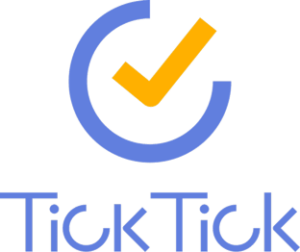
TickTick — Good for creating memos
Available on
- Web
- iOS
- Android
- Windows
- Mac
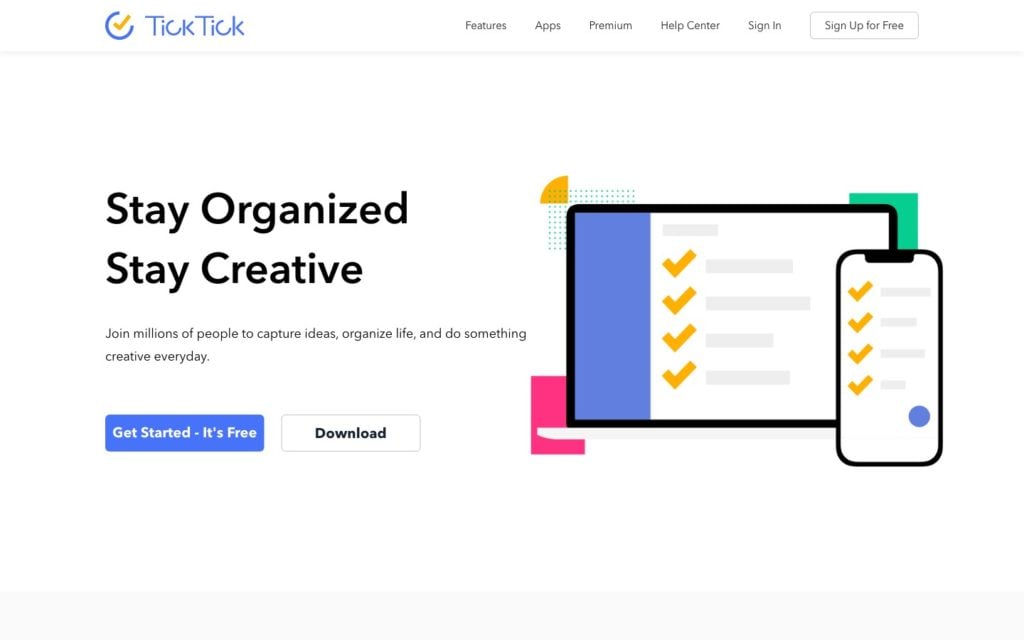
Another productivity app that is designed specifically to improve good habits, TickTick is bound to raise your productivity. Users can create their own tasks and set deadlines and reminders. This planner app is also collaborative, so users can work together to get tasks done.
One of TickTick’s missions is to empower all users to use the app to stay organized and creative. This planner app will benefit users who need to make memos, collaborate with team members, develop habits, schedule meetings, and even share lists.
Key Features
- Task prioritization
- Built-in timer and stopwatch
- "Gamified" habit tracker
- Tasks shareable with up to 29 members
Pros
- Intuitive design
- Compatible with iOS and Android
Cons
- Restrictions on both paid and free accounts
- No free trial
Pricing
Starts at $116.50/month Trial: Yes Free Plan: No
Compare the Best Planner Apps
| Topic |
 Start for free
Start for free
|
|
|

|
|

|

|

|

|

|
|---|---|---|---|---|---|---|---|---|---|---|
| Reviews |
4.8
|
4.9
|
4.8
|
4.4
|
4.5
|
4.7
|
N/A
|
4.6
|
4.3
|
4.8
|
| Pricing |
Starts at just $29/month for the first 30 users
|
Starts at $49.99
|
Contact vendor for price
|
Starts at $3/month, without Collaborative Workspace
|
Starts at $5/user/month
|
Starts at $12/user/month
|
Starts at $2 per user, per month
|
Starts at $150/month, for 50 users
|
Starts at $159/month, for 50 users
|
Starts at $116.50/month
|
| Free Trial |
yes
14-day
|
yes
|
no
|
yes
For the Teams plan
|
yes
14 days
|
no
|
yes
30-day
|
yes
|
yes
|
yes
|
| Free Plan |
yes
Free Up to 10 users
|
no
|
yes
|
yes
For personal use only
|
yes
|
yes
|
no
|
yes
|
no
|
no
|
| Use cases |
Best all-in-one planner app
|
Good for iOS users
|
Best for scheduling tasks and meetings
|
Good for creating checklists
|
Good for team collaboration
|
Good for customizability
|
Good for companies that use Microsoft 365
|
Good for task management
|
Good for building healthy habits
|
Good for creating memos
|
| Available on |
Web, iOS, Android, Mac
|
Web, iOS, Android
|
|
Web, iOS, Android, Windows, Mac
|
What are Planner Apps?
Planner apps make it easier for users to stay organized. This type of software or application keeps all of your planning tools in one centralized location, making it easy to find and edit checklists, tasks, calendars, notes, and lists. The best planner apps include functions like appointment and event scheduling, customizable calendars, contact directories, as well as to-do lists to put tasks and responsibilities in order.
How Do Planner Apps Work?
Planner apps are digital tools for organizing important tasks, time, lists, and events. Users create tasks with due dates, priorities, and notes, and reminders and notifications keep users on track. Collaboration features, including task sharing and cloud-based syncing, ensure accessibility on multiple devices, including iPhones and iPads.
Some apps offer productivity insights and reporting so users can more easily track their goals. Overall, planner apps streamline task management and encourage efficiency among teams.
How Much Do Planner Apps Cost?
Planner apps vary in price based on features and plan packages. For example, Habitica is a more expensive option costing $159/month for 50 users, while Things is a more affordable option, costing $49.99/month.
Generally, we recommend choosing a planner app that provides the widest range of features at the most affordable price.
Connecteam offers great value for money and is the best planner app on the market. And if you’re looking for the best free small business app, you’re in luck: small businesses can sign up for Connecteam’s Small Business Plan, which offers a completely free plan for up to 10 users. For larger teams, premium plans start at just $29 per month for up to 30 users.
What are the Benefits of Planner Apps
These are the most important benefits of using planner apps and schedule apps at work:
- Task organization: Planner apps help users categorize and prioritize tasks, ensuring a clear overview of what needs to be accomplished and when.
- Time management: By setting due dates and reminders, users can efficiently allocate their time and avoid missing important deadlines.
- Increased productivity: The ability to track and manage tasks leads to better productivity, ensuring that work progresses smoothly and efficiently.
- Collaboration and teamwork: For team-based apps, collaboration features facilitate seamless communication and coordination among team members, enhancing overall teamwork.
- Accessibility: Cloud-based planner apps allow users to access their schedules and tasks from multiple devices, promoting flexibility and productivity on the go.
- Improved focus and concentration: Knowing what needs to be done and when allows users to concentrate on completing tasks without distraction.
- Goal-tracking: Users can set and track goals and stay on course to achieve long-term objectives.
- Efficient resource allocation: With planner apps, team members can allocate time and resources so they can make sure everything gets done.
- Analytics and insights: The best planner apps provide productivity analytics, allowing users to identify patterns, inefficiencies, and opportunities for improvement.
- Adaptability and customization: Planner apps allow customization to suit individual preferences and workflows.
FAQs
Many planner apps offer free trials so users can test them out before committing to purchase. However, there are free planner apps on the market, like Google Calendar, if used without purchasing Google Workspace.
However, the best free planner app is Connecteam. Connecteam’s Small Business Plan is 100% free for businesses with up to 10 users. This plan includes complete employee management features, like task management, scheduling features, and customizable forms, documents, and checklists.
Not all planner apps include payroll capabilities or integrate with payroll and accounting software. However, solutions like Connecteam integrate with popular payroll software like QuickBooks Online and Gusto. A couple of clicks is all it takes for managers to export invoices, bills, and payroll.
Yes. This software helps businesses manage schedules and tasks, create calendars, and save important files and checklists.
The Bottom Line On Planner App
Planner apps help ensure that businesses run efficiently by making sure that all of your calendars, scheduling and to-do lists tools are accessible in one place.
Whether it be task management, shift scheduling, or time tracking features, Connecteam is the best planner app to help you keep your work days, weeks, and months focused and organized.

